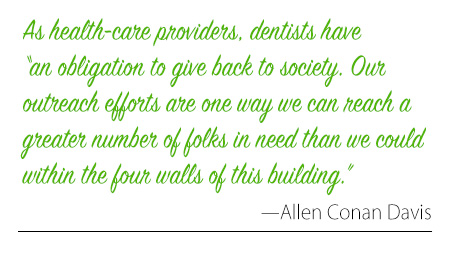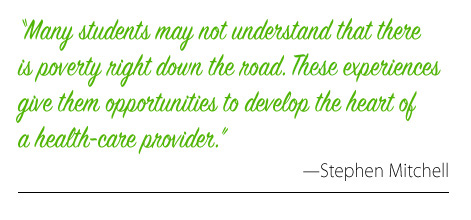Media contact: Adam Pope, arpope@uab.edu
 For Jonathan Risner, one week of dental school may have changed the course of his career.
For Jonathan Risner, one week of dental school may have changed the course of his career.
During his final semester, Risner, an Evansville, Ind., native, journeyed to south Alabama to work at the Poarch Band of Creek Indians health clinic near Atmore. Like all UAB School of Dentistry students, Risner had participated in a variety of community-outreach programs, but working with Indian Health Services was especially enlightening. “I find that a large majority of patients with low socioeconomic status are more appreciative of receiving dental care,” he says. “Although the procedures they need may not be the most lucrative, experiencing the depth of their gratitude is rich compensation.”
Now Risner will spend the next year completing a dental residency program on the Navajo reservation in northern Arizona. Beyond that, “I can see myself spending a portion of my career on a reservation,” he says.
A win-win-win situation
Risner’s experience demonstrates the triple benefits of the School of Dentistry’s community-based education, research, and service: Students gain access to unique learning opportunities, people in need receive crucial oral health care, and newly minted dentists graduate with a desire to help others. In recent years, the school has strengthened its focus on Alabama communities by expanding relationships with private practices, health-center clinics, and public-health departments across the state.
As health-care providers, dentists have “an obligation to give back to society,” says Allen Conan Davis, D.M.D., M.P.H., assistant dean for community collaborations and public health. “Our outreach efforts are one way we can reach a greater number of folks in need than we could within the four walls of this building on campus.” Improving access to dental care also has long-term benefits; research shows that poor oral health can lead to other serious health complications, says Davis, who formerly served as Alabama’s public-health dental director and chief dental officer at the U.S. Centers for Medicare and Medicaid.

Empathy and independence
All UAB dental students must fulfill service requirements that include developing oral-health education presentations and conducting screenings for schoolchildren, along with conducting oral-cancer screenings at homeless shelters. Students also complete weekly clinical rotations at local community health centers. “These voluntary and scheduled clinical activities provide students with a larger picture of the world around them and introduce them to situations they might not encounter at the dental school; we also hope to build empathy toward the less fortunate,” Davis says. “Our outside partners enjoy instructing and working with our students. They say that our students’ enthusiasm and curiosity is contagious.”
The school also awards stipends to senior dental students, like Risner, to spend a week in a voluntary clinical rotation with a community health center. Those partners include Mobile’s Franklin Primary Care Center, Tuscaloosa’s Maude Whatley clinic, Gadsden Quality of Life clinic, Montgomery Primary Care clinic, the Poarch Band of Creek Indians clinic, and a Huntsville school-based dental clinic. “The dentists at these sites are credentialed as adjunct faculty and serve as instructors to these seniors during that week away,” Davis says.
Risner’s week at the Poarch Creek Indian Clinic was the first time he was able to practice dentistry on his own. “I was able to practice independently, yet still had the safety net of more experienced providers in the rooms next to me,” he says. “This was especially helpful when learning the new materials and techniques that are specific to Indian Health Services. I was able to take what I had learned back to UAB and discuss the advantages and disadvantages of the materials and techniques with the faculty.”
Participating in outreach programs also offers dental students insight into the populations who need their services. “Many students may come from affluent backgrounds and may not understand that there is poverty right down the road,” says Stephen Mitchell, D.M.D., associate professor and director of UAB’s undergraduate clinic in pediatric dentistry. “These experiences give them opportunities to develop the heart of a health-care provider.”

New dentists in town
While dental outreach can help produce better dentists, it also can leave a lasting impact on the underserved communities and the people living in them. In some cases, visiting students have become permanent residents, dedicating part or all of their careers to practicing in those areas, with the School of Dentistry’s support.
Currently, the school provides loan-forgiveness grants of $100,000 for qualifying candidates who choose to set up practice in a rural, underserved area of Alabama, accept up to 30 percent Medicaid patients, and stay there for at least four years, Davis says. This program awards three grants each year, but is seeking new funding for the future. As of the summer of 2015, nine young graduates had received grants to start practicing. (Similar programs include the State Board of Dental Scholarships, which awards grants and loans to students with the expectation that they don’t have to repay loans if they practice in qualified rural areas, and the National Health Service Corps loan repayment program for dental students willing to practice in approved rural community health-center sites and receive loan forgiveness for time commitments.)
The school also is expanding its general dental practice residency program beyond Birmingham to locations around the state, including Huntsville, Tuscaloosa, Florence, and Mobile. “We hope to send our predoctoral students on rotation to these sites for additional exposure to rural and underserved patients,” Davis says.
“There is a lot of work to be done in Alabama,” he continues. “We hope to eventually change the situation that many Alabamians face with inadequate access to care, and we want to encourage our students to help lead these efforts.”
A team approach to healthIt’s all hands on deck to improve oral health in Alabama. Through a DentaQuest Foundation grant, the UAB Smiles for Alabama Initiative brings together UAB dentistry, medicine, nursing, optometry, public health, and health professions students to develop their basic oral-health knowledge; they also conduct screenings for children and elderly adults. The goal is to give a greater number of health professionals the ability to spot patients with oral-health issues and to collaborate with colleagues to treat and refer patients appropriately. |